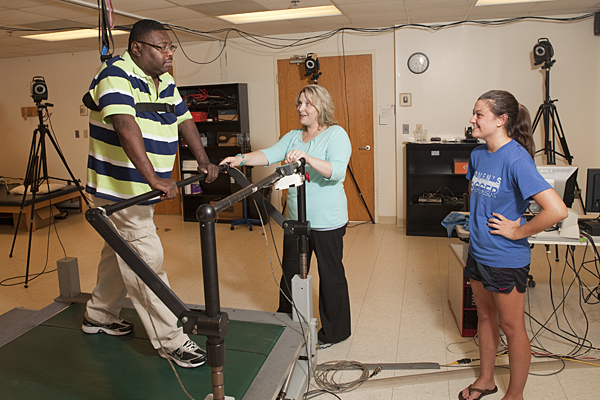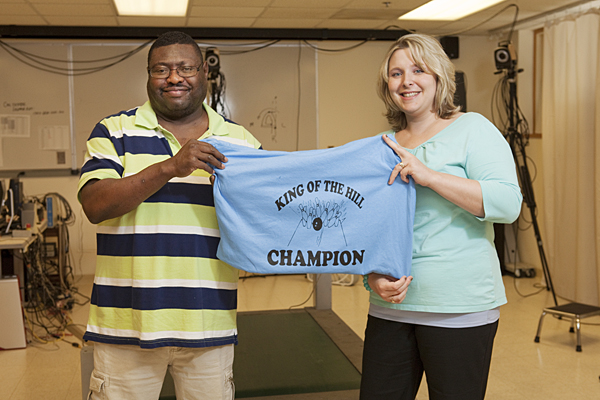


A strike against stroke
UD stroke study helps bowler get back to the lanes
11:41 a.m., Aug. 15, 2011--Following a stroke in February 2009, Dave Stovall doubted he would ever bowl again. But intensive therapy at a rehabilitation center, followed by participation in a University of Delaware research study, enabled the competitive bowler not only to play again but to win.
Bowling runs in Stovall’s family. His father and brother are both accomplished competitors, and his daughter attends Morgan State University on a full bowling scholarship. But after his stroke, Stovall was unable to regain his stepping, or bowling approach, so that he could play at his previous level.
People Stories
'Resilience Engineering'
Reviresco June run
Stovall had heard about an ongoing study led by Prof. Darcy Reisman in UD’s Department of Physical Therapy aimed at determining whether training on a split-belt treadmill can help stroke survivors learn a more symmetric walking pattern.
On a split-belt treadmill, the speed of each belt can be controlled independently. Because separate nerve networks control the movement of each leg, the technology helps the brain to “rewire” so that gait asymmetries are diminished and people walk with less effort.
Stovall qualified for the study, which involved three treatments a week for four weeks with physical therapist Kelly Danks.
“She worked me hard,” Stovall says. But the work paid off—in June, Stovall won the King of the Hill Championship at Pleasant Hill Lanes in Stanton, Del.
“I could hear Kelly in my head telling me to take bigger steps,” he adds. “She helped me become much more conscious of my stepping.”
Stovall’s success at the lanes is exactly the kind of news that the research team likes to hear.
“Dave not only improved his walking,” Danks says, “but the improvement translated into something that’s important to him. We impacted his stepping so he could get back to bowling. For someone else, walking better might mean being able to get to the bathroom without help.”
Stovall also notes that to win the King of the Hill Championship, he had to bowl five games. “Three used to kill me,” he says. “But the work on the treadmill gave me the stamina to get through two qualifying rounds and three tournament games.”
Stovall now enjoys bowling several nights a week with his family. He is also participating in another UD-PT stroke study with Danks and Reisman aimed at increasing physical activity in people with stroke through the use of specialized pedometers called step activity monitors.
“We can’t assume that improving patients’ walking ability will translate into them being more active,” Reisman says. “We’re looking for strategies to help people live healthier lives and not allow the stroke to start a downward spiral of inactivity.”
Danks encourages all stroke survivors to increase activity level. “By participating in stroke research at UD, people with a wide range of ability can achieve their personal goals,” she says.
Stovall is well on his way to reaching his healthy exercise goals. He recently logged 10,000 steps in one day, the number recommended by the Shape Up America program.
About the research
Reisman is an assistant professor in the Department of Physical Therapy and an affiliated faculty member in UD’s interdisciplinary Biomechanics and Movement Sciences (BIOMS) graduate program.
Her research on locomotor adaptations following stroke is supported by a National Institutes of Health (NIH) grant.
The study in which Stovall is currently participating, “Fast Treadmill Training/Functional Electrical Stimulation to Improve Walking,” is led by Stuart Binder McLeod, Edward L. Ratledge Professor, BIOMS faculty affiliate and chair of the Department of Physical Therapy, with Reisman as a co-investigator. The work is partially funded by another NIH grant.
Danks is a research physical therapist who is part of the stroke studies research team in the department.
Article by Diane Kukich
Photos by Ambre Alexander









